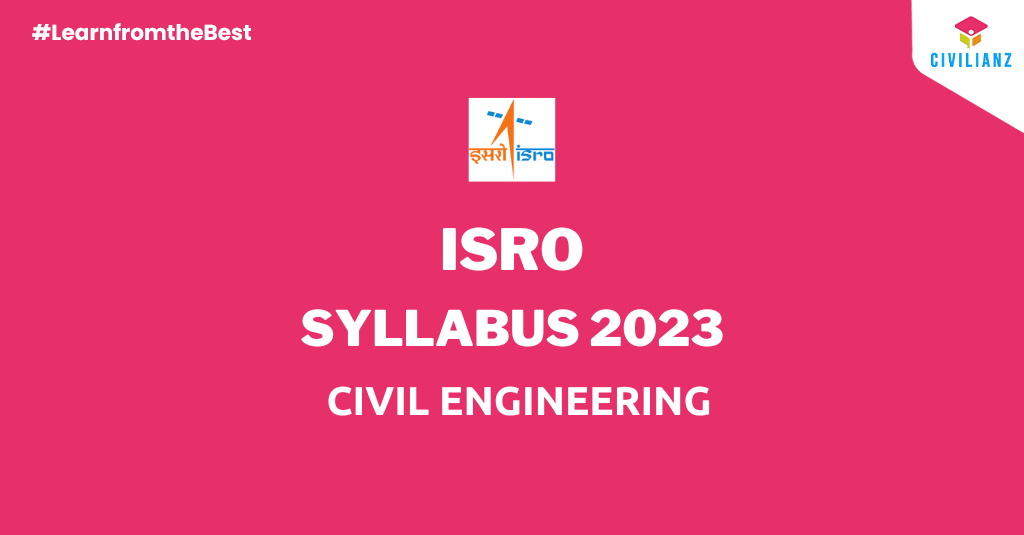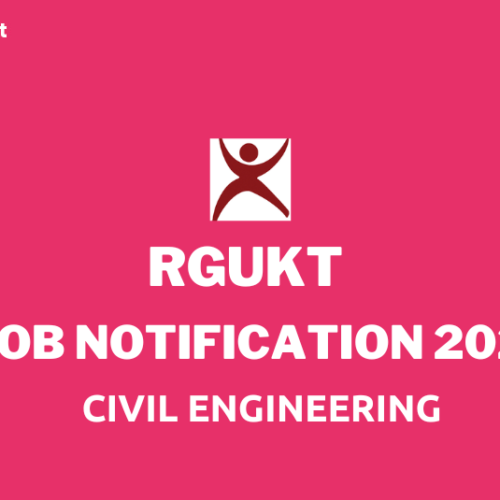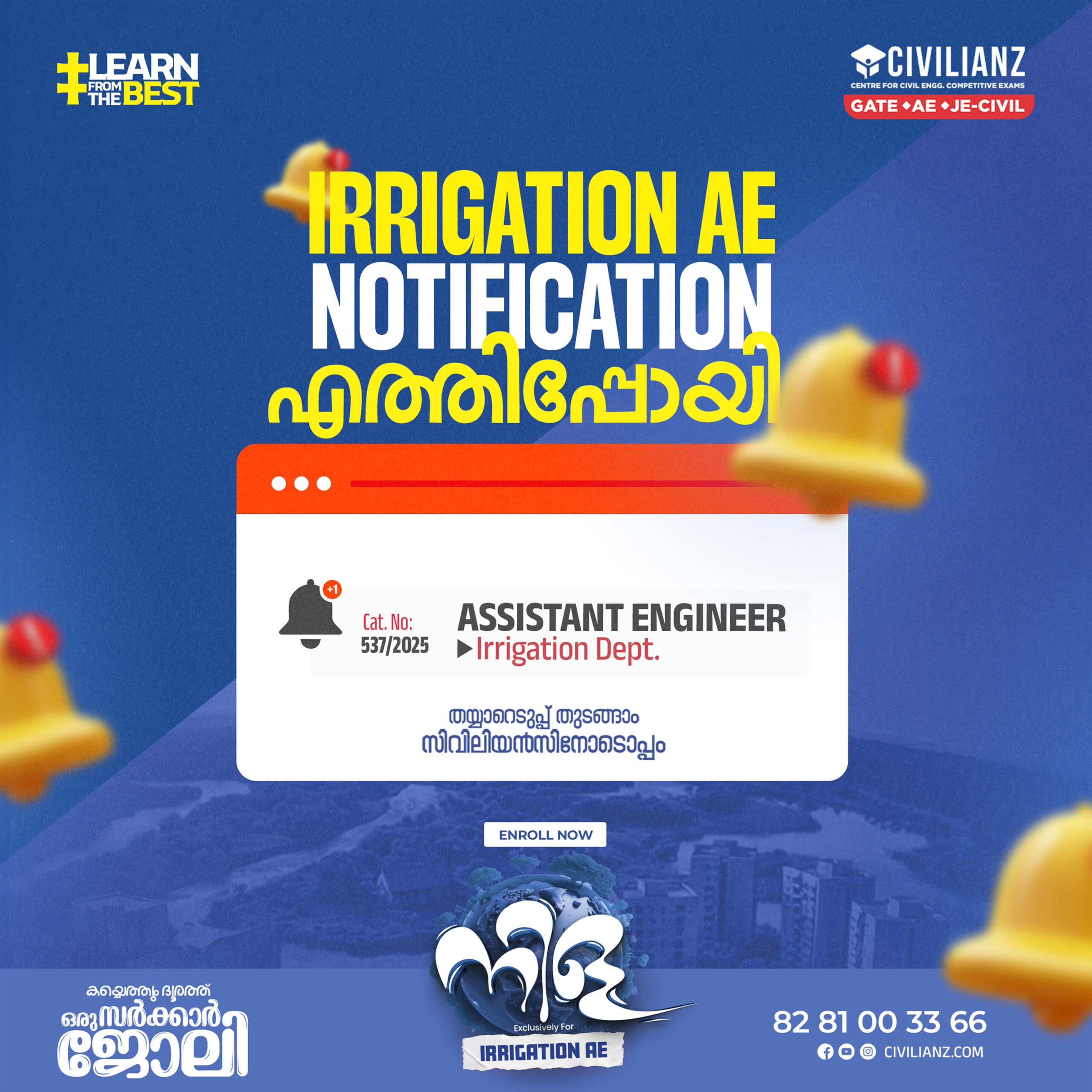
ISRO SCIENTIST / ENGINEER CIVIL SYLLABUS 2023
| Name of the Department | Indian Space Research Organisation – ISRO |
| Name of the Post | Scientist/Engineer ‘SC’ (Civil) |
| Date of the Examination | 17 December 2023 |
| Vacancy | 39 |
| Official website | www.isro.gov.in |
Indian Space Research Organisation/ Department of Space Centres/Units are engaged in Research and Development activities in the realm of Space Application, Space Science and Technology for the benefit of society at large and for serving the nation by achieving self-reliance and developing capacity to design and build Launch Vehicles and Communication/Remote Sensing Satellites and thereafter launch them.
NAME OF POST
| Name of post | Vacancy |
| Scientist/Engineer ‘SC’ (Civil) | 39 |
PREVIOUS YEAR CUT OFF
| Previous Year Cut off ( 2020) | General -197 OBC- 185 EWS-188 |
ISRO EXAM PATTERN
| Phases | Paper | Total No. of Questions | Time Duration |
| I II |
Written Test: Part A Written Test: Part B ( General Aptitude) |
80 15 |
120 Minutes |
| III | Interview | Not Disclosed | Not Disclosed |
ISRO SYLLABUS OF CIVIL ENGINEERING
Structural Engineering
Engineering Mechanics: System of forces, free-body diagrams, equilibrium equations; Internal forces in structures; Frictions and its applications; Centre of mass; Free Vibrations of undamped SDOF system.
Solid Mechanics: Bending moment and shear force in statically determinate beams; Simple stress and strain relationships; Simple bending theory, flexural and shear stresses, shear centre; Uniform torsion, Transformation of stress; buckling of column, combined and direct bending stresses.
Structural Analysis: Statically determinate and indeterminate structures by force/ energy methods; Method of superposition; Analysis of trusses, arches, beams, cables and frames; Displacement methods: Slope deflection and moment distribution methods; Influence lines; Stiffness and flexibility methods of structural analysis.
Construction Materials and Management: Construction Materials: Structural Steel – Composition, material properties and behavior; Concrete – Constituents, mix design, short-term and long-term properties. Construction Management: Types of construction projects; Project planning and network analysis – PERT and CPM; Cost estimation.
Concrete Structures: Working stress and Limit state design concepts; Design of beams, slabs, columns; Bond and development length; Prestressed concrete beams.
Steel Structures: Working stress and Limit state design concepts; Design of tension and compression members, beams and beam-columns, column bases; Connections – simple and eccentric, beam-column connections, plate girders and trusses; Concept of plastic analysis -beams and frames.
Geotechnical Engineering
Soil Mechanics: Three-phase system and phase relationships, index properties; Unified and Indian standard soil classification system; Permeability – one dimensional flow, Seepage through soils – two – dimensional flow, flow nets, uplift pressure, piping, capillarity, seepage force; Principle of effective stress and quicksand condition; Compaction of soils; One- dimensional consolidation, time rate of consolidation; Shear Strength, Mohr’s circle, effective and total shear strength parameters, Stress-Strain characteristics of clays and sand; Stress paths.
Foundation Engineering: Sub-surface investigations – Drilling bore holes, sampling, plate load test, standard penetration and cone penetration tests; Earth pressure theories – Rankine and Coulomb; Stability of slopes – Finite and infinite slopes, Bishop’s method; Stress distribution in soils – Boussinesq’s theory; Pressure bulbs, Shallow foundations – Terzaghi’s and Meyerhoff’s bearing capacity theories, effect of water table; Combined footing and raft foundation; Contact pressure; Settlement analysis in sands and clays; Deep foundations – dynamic and static formulae, Axial load capacity of piles in sands and clays, pile load test, pile under lateral loading, pile group efficiency, negative skin friction.
Water Resources Engineering
Fluid Mechanics: Properties of fluids, fluid statics; Continuity, momentum and energy equations and their applications; Potential flow, Laminar and turbulent flow; Flow in pipes, pipe networks; Concept of boundary layer and its growth; Concept of lift and drag.
Hydraulics: Forces on immersed bodies; Flow measurement in channels and pipes; Dimensional analysis and hydraulic similitude; Channel Hydraulics – Energy-depth relationships, specific energy, critical flow, hydraulic jump, uniform flow, gradually varied flow and water surface profiles.
Hydrology: Hydrologic cycle, precipitation, evaporation, evapo-transpiration, watershed, infiltration, unit hydrographs, hydrograph analysis, reservoir capacity, flood estimation and routing, surface run- off models, ground water hydrology – steady state well hydraulics and aquifers; Application of Darcy’s Law.
Irrigation: Types of irrigation systems and methods; Crop water requirements – Duty, delta, evapo- transpiration; Gravity Dams and Spillways; Lined and unlined canals, Design of weirs on permeable foundation; cross drainage structures.
Environmental Engineering
Water and Waste Water Quality and Treatment: Basics of water quality standards – Physical, chemical and biological parameters; Water quality index; Unit processes and operations; Water requirement; Water distribution system; Drinking water treatment.
Sewerage system design, quantity of domestic wastewater, primary and secondary treatment. Effluent discharge standards; Sludge disposal; Reuse of treated sewage for different applications.
Air Pollution: Types of pollutants, their sources and impacts, air pollution control, air quality standards, Air quality Index and limits.
Municipal Solid Wastes: Characteristics, generation, collection and transportation of solid wastes, engineered systems for solid waste management (reuse/ recycle, energy recovery, treatment and disposal).
Transportation Engineering
Transportation Infrastructure: Geometric design of highways – cross-sectional elements, sight distances, horizontal and vertical alignments. Geometric design of railway Track – Speed and Cant. Concept of airport runway length, calculations and corrections; taxiway and exit taxiway design.
Highway Pavements: Highway materials – desirable properties and tests; Desirable properties of bituminous paving mixes; Design factors for flexible and rigid pavements; Design of flexible and rigid pavement using IRC codes
Traffic Engineering: Traffic studies on flow and speed, peak hour factor, accident study, statistical analysis of traffic data; Microscopic and macroscopic parameters of traffic flow, fundamental relationships; Traffic signs; Signal design by Webster’s method; Types of intersections; Highway capacity.
Geomatics Engineering
Principles of surveying: Errors and their adjustment; Maps – scale, coordinate system; Distance and angle measurement – Levelling and trigonometric levelling; Traversing and triangulation survey; Total station; Horizontal and vertical curves.
Photogrammetry and Remote Sensing: Scale, flying height; Basics of remote sensing and GIS
NOTIFICATION LINK
DOWNLOAD DETAILED ADVERTISEMENT
Civilianz stands as the top Civil Engineering Coaching Center in Kerala, specializing preparing students for various Civil Engineering Competitive exams. Our comprehensive coaching program covers a range of exams, including GATE – Civil, Assistant Engineer, Assistant Professor Civil, Lecturer in Polytechnic, Junior Engineer- Civil, Overseer, Tracer, and other similar civil engineering competitions.
Civil Engineering മത്സരപരീക്ഷകൾക്കെല്ലാം ഇനി ഒരൊറ്റ solution 🔥
Basic level മുതൽ Advanced level വരെയുള്ള Civil Engineering subjects ക്ലാസ്സുകളും workout സെഷൻസും ഉൾപ്പെടുന്ന VAJRA BATCH by Civilianz ✨
Useful for all Civil Engineering Competitive exams ⭐📚
Course features
💎 Pre recorded classes taken by expert faculty team
💎 Assessment tests
💎 Mentor support
💎 Civil Engineering Handwritten notes (E-book)
💎 Discussion board for doubt clearance
Special features
📝 Video classes discussing higher level questions
📝 MCQ Book
📝 Notes of advanced level questions and answers (useful for GATE and ESE)
ഇനി പരീക്ഷകളെ അനായാസം നേരിടാം, വിജയം സുനിശ്ചിതമാക്കാം 🥇
For more details, contact 👇🏻
📱8281003366
CIVILIANZ SOCIAL MEDIA PLATFORMS
Our Social media platforms are exclusively for Civil Engineering students, job candidates, teachers and all those who have passion for Civil Engineering.
You will get
-
Civil engineering quiz
-
Regular job notifications
-
Exam notifications
-
PDF notes
-
Study tips
-
Civil related discussion and all in this group.
JOIN OUR SOCIAL MEDIA PLATFORMS
#learnfromthebest










Leave a comment